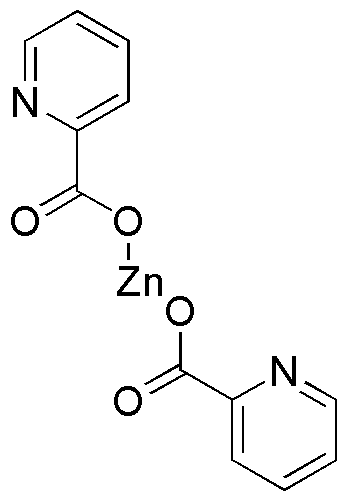Zinc picolinate is widely utilized in research focused on:
- Dietary Supplements: Commonly used in nutritional products, it enhances zinc absorption compared to other forms, making it a preferred choice for those looking to boost their immune system or improve skin health.
- Pharmaceuticals: Employed in formulations aimed at treating zinc deficiency, it supports various bodily functions, including wound healing and protein synthesis, which are crucial in clinical settings.
- Agriculture: Utilized as a micronutrient in fertilizers, it promotes plant growth and development, particularly in zinc-deficient soils, benefiting crop yield and quality.
- Cosmetics: Incorporated in skincare products for its anti-inflammatory properties, it helps in treating acne and promoting overall skin health, appealing to consumers seeking effective skincare solutions.
- Research Applications: Used in biochemical studies to investigate zinc's role in cellular processes, it aids researchers in understanding its impact on health and disease, providing valuable insights for future therapies.
Informations générales
Propriétés
Sécurité et réglementation
Applications
Zinc picolinate is widely utilized in research focused on:
- Dietary Supplements: Commonly used in nutritional products, it enhances zinc absorption compared to other forms, making it a preferred choice for those looking to boost their immune system or improve skin health.
- Pharmaceuticals: Employed in formulations aimed at treating zinc deficiency, it supports various bodily functions, including wound healing and protein synthesis, which are crucial in clinical settings.
- Agriculture: Utilized as a micronutrient in fertilizers, it promotes plant growth and development, particularly in zinc-deficient soils, benefiting crop yield and quality.
- Cosmetics: Incorporated in skincare products for its anti-inflammatory properties, it helps in treating acne and promoting overall skin health, appealing to consumers seeking effective skincare solutions.
- Research Applications: Used in biochemical studies to investigate zinc's role in cellular processes, it aids researchers in understanding its impact on health and disease, providing valuable insights for future therapies.
Documents
Fiches de données de sécurité (FDS)
La FDS fournit des informations de sécurité complètes sur la manipulation, le stockage et l’élimination du produit.
Spécifications du produit (PS)
Le PS fournit une description complète des propriétés du produit, notamment sa composition chimique, son état physique, sa pureté et les exigences de stockage. Il détaille également les plages de qualité acceptables et les applications prévues du produit.
Certificats d'analyse (COA)
Recherchez des certificats d'analyse (COA) en saisissant le numéro de lot du produit. Les numéros de lot et de lot se trouvent sur l'étiquette d'un produit, après les mots « Lot » ou « Lot de fabrication ».
Numéro de catalogue
Numéro de lot/série
Certificats d'origine (COO)
Ce certificat d'exploitation confirme le pays dans lequel le produit a été fabriqué, et détaille également les matériaux et composants utilisés et s'il est issu de sources naturelles, synthétiques ou autres sources spécifiques. Ce certificat peut être requis pour les douanes, le commerce et la conformité réglementaire.
Numéro de catalogue
Numéro de lot/série
Fiches de données de sécurité (FDS)
La FDS fournit des informations de sécurité complètes sur la manipulation, le stockage et l’élimination du produit.
DownloadSpécifications du produit (PS)
Le PS fournit une description complète des propriétés du produit, notamment sa composition chimique, son état physique, sa pureté et les exigences de stockage. Il détaille également les plages de qualité acceptables et les applications prévues du produit.
DownloadCertificats d'analyse (COA)
Recherchez des certificats d'analyse (COA) en saisissant le numéro de lot du produit. Les numéros de lot et de lot se trouvent sur l'étiquette d'un produit, après les mots « Lot » ou « Lot de fabrication ».
Numéro de catalogue
Numéro de lot/série
Certificats d'origine (COO)
Ce certificat d'exploitation confirme le pays dans lequel le produit a été fabriqué, et détaille également les matériaux et composants utilisés et s'il est issu de sources naturelles, synthétiques ou autres sources spécifiques. Ce certificat peut être requis pour les douanes, le commerce et la conformité réglementaire.


